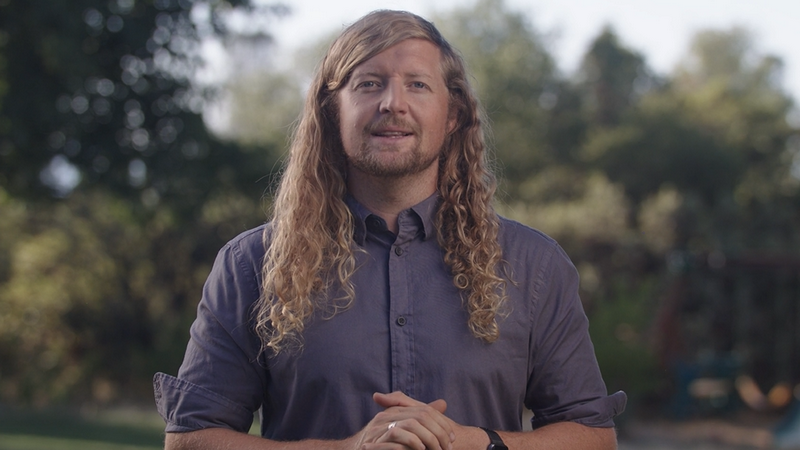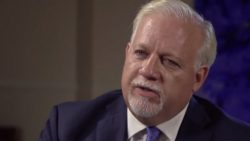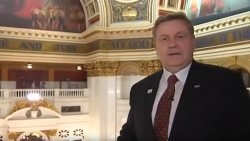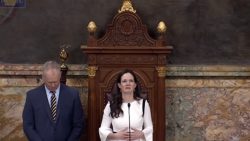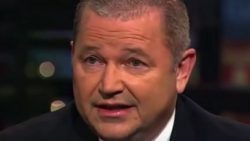Sean Feucht (pronounced FOYT), a musician and worship leader associated with a controversial California megachurch, announced on Friday that he is running for Congress in California’s 3rd Congressional District, which is located north of San Francisco. Christian nationalist political operative David Lane, who believes the U.S. has a national covenant with God to advance the Christian faith, saluted Feucht’s run in Charisma on Monday.
“For spiritual resurrection in America to become possible, Sean and Millennials and Generation Z’s like him will have no other choice than to return American Christendom to the ekklesia model,” Lane wrote. Dominionst leaders often use the word ekklesia to refer to the church as God’s governing body in the world.
“He is known and loved by millions for his music and missions,” Feucht’s wife says in a campaign video. “Now he is willing to sacrifice his calling for a greater one—to restore the identity, values and morals of this great nation.”
Feucht’s campaign website declares:
America is not just a country, it’s a legacy built on a foundation of hope and truth. A beacon to the world. Sadly, our leaders in Congress have FAILED us time and time again.
Family values are being eroded, the unborn are sacrificed, morals are low, and taxes are high. Families face unimaginable challenges to make ends meet. We need a new generation of leaders. Leaders with a vision, leaders who don’t seek a career, but are willing to sacrifice to fight for what is right.
At his campaign’s Friday night launch event, Feucht talked about the need for spiritual revival to bring about societal “reformation,” rhetoric regularly used by dominionist leaders. “We believe that revival is coming to America,” Feucht said. “We also believe that there’s a reformation that must happen. And at some point in our lives we have to literally become the fulfillment of our prayers. We can’t just pray. We have to actually take action.”
He said that “millions of fathers, mothers and believers, and everyday hard-working Americans are standing with me at this exact fork in the road. If we continue to walk a path where our values are not respected, where our faith is not tolerated, where life is not valued, where the family is not honored, our path will be one of destruction and decay. We must choose a different path.”
Feucht called on people to “stand for our values and defend our faith,” and warned of attacks from the intolerant. “They will belittle us, they will taunt us, they will ridicule us, and through it all we must march on together,” he said. More from Feucht:
I don’t stand here today to tell you that our government is morally and economically bankrupt. I am not here to tell you that leaders who feverishly promote the slaughter of the unborn—and the newborn—are unfit for office, because you know all these things just like I do. I stand here today to tell you it’s time. It’s time we stopped complaining and we fight back. It’s time to get out of our comfort zone and battle back. It’s time to stand up and be counted. It’s time to risk being called a name in order to fight for the future of our children. It’s time to be more than just angry. It’s time to act.”
Feucht also debuted his campaign’s theme song, whose chorus urges, “This is our time to stand up, stand up. This is our time to speak up, speak up. This is our moment. We’re gonna own it. We’ll be the change.” On his Facebook page, Feucht thanked the “hundreds” who he said attended the event and “the more than 10,000 who streamed online and those who are standing with us from around the world.”
Feucht was called out on Twitter for another part of his Friday night speech, in which he portrayed the 2015 murders of black churchgoers at Mother Emanuel church in Charleston, South Carolina, as an example of “Christian persecution,” in which “believers were killed for their faith.” In reality, killer Dylann Roof was motivated by racism and white supremacist conspiracy theories.
In a light-on-substance one-minute campaign ad narrated by Feucth’s wife, she praises her husband’s character and willingness to fight for what’s right as a man “not driven by ego, but purpose.” It closes with Feucht saying, “I’m not going to sit back and watch and wait. It’s time for my generation to step forward and join the fight for America.”
Another campaign video has a much bleaker tone. “What is happening to the identity of America?” the ad asks, before showing images of protesters clashing with police and burning the flag. Then, while showing clips of Democratic politicians, the ad says, “Our leaders are running it into the ground with their liberal ethics and political agendas.” The video charges that “Family values are being eroded, the unborn are sacrificed, morals are low and taxes are high.”
Feucht is associated with Bethel Church, which is based in Redding, California, but has a global reach through its extremely popular Christian music label, its School for Supernatural Ministry, and the books and media reach of its pastor Bill Johnson. Brad Christerson, co-author of “The Rise of Network Christianity,” puts Bethel at the center of what he calls Independent Network Charismatic Christianity, whose leaders operate outside of denominational lines of authority and run their ministries as entrepreneurial marketing operations. (Bethel left the Assemblies of God in 2005.)
Johnson and Trump-promoting prophet Lance Wallnau co-edited a book called “Invading Babylon: The 7 Mountain Mandate.” Seven Mountains dominionism identifies seven “mountains” or spheres of influence in society over which the right of kind of Christians should be in charge: home, church, education, media, government, arts and entertainment, and business. In his opening chapter of the book, Johnson wrote, “Kingdom-oriented people must invade these mountains of influence in order for the transformation of society to take place.”
Johnson has been publicly characterized as part of the New Apostolic Reformation, a network of “prophetic” leaders, though he has told Christian journalists he doesn’t really know what the NAR is. He does share a belief promoted by NAR leaders—like Cindy Jacobs—that God has given great supernatural power to this generation’s apostles and prophets and that God wants Christians to achieve societal reformation as well as personal salvation. Johnson says he wants to change the culture; a Christianity Today reporter wrote in 2016 that for Johnson, “this looks like a kingdom accrual of soft power in the world.”
Bethel “glamorizes” conversion therapy, according to journalist Nico Lang, and promotes “ex-gay” ministries. Ryan O’Callaghan, a former NFL player whose memoir describes the difficulties of growing up gay and closeted in Redding, recently called the church a “cult.”
Bethel’s impact on Redding has been undeniable. The church and the people it brings to Redding have been a boon to the local economy, and the church has made contributions to support the city budget and police force. In 2017, the city’s planning commission unanimously approved a massive expansion in Bethel’s campus. But Bethel’s presence—which can include students at the School of Supernatural Ministry running around town looking for people to heal—has left some residents “afraid and even angry about the growing influence of this church in their city and their lives.”
Bethel has plenty of critics, even within Christian evangelical circles, and it’s not hard to find apologetics websites challenging the church’s theology, unorthodox practices practiced by some students like “grave sucking” (lying down on the grave of a dead prophet in order to soak up some of their spiritual anointing) and spiritual claims about miracles and signs of God’s presence, like gold dust and angel feathers emerging from “glory clouds” during worship.
But Feucht’s announcement drew immediate support from “prophet” Cindy Jacobs and Beni Johnson, wife of Bethel leader Bill Johnson, as well as positive coverage from Pentecostal-oriented media outlet Charisma and from the Christian Broadcasting Network, which quoted from his launch video and said his campaign is “stressing the importance of family values, hope, and truth.”
Among those responding to Feucht’s announcement was a California activist who tweeted what he said were corrected versions of “false” graphics Feucht had posted about several pieces of California legislation. Feucht’s announcement has drawn some online criticism from local conservatives who are supporting another Republican candidate, Tamika Hamilton, a black woman veteran who is already running. The seat is currently held by Democrat John Garamendi.
On Sunday, Feucht portrayed himself as a victim of persecution, writing on his Facebook page, “Our family is exposed to attacks on levels we’ve never encountered before,” but, he added, “Our spirits are strong after spiritual fathers/giants prayed over and commissioned us this morning!!”





